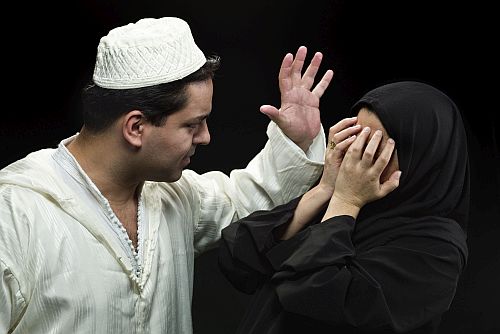Why Are Women Mistreated In The Islamic World?

Last week in the eastern Afghan city of Jalalabad a female doctor was killed in a bomb blast just days after three female media workers were shot dead in the area.
Honor killings — based in medieval tribal culture, in which a family’s authority and ultimately its survival is tightly linked to its honor — are not the average mistreatment of women in Muslim society, notwithstanding that Muslims commit 91 percent of honor killings worldwide. Muslim women, nevertheless, have historically been treated as second class individuals, or rather property, since the inception of the Islamic religion.
In November 2014, Islamist President Recep Tayyip Erdoğan declared that women and men cannot be treated equally.
Why is this? It is because women inferior to men, and therefore are treated unequally as dictated by Allah’s commandment. Such inequality is enshrined in the immutable law by Muhammad and eventually recorded in the Quran, which are incorporated into contemporary law in most Muslim countries.
Misogyny in the Quran and Islamic Tradition
The fact that men are a superior to their female counterparts is evident in the following Quranic verses:
- “Your wives are as a tilth unto you; so approach your tilth when or how ye will…” —Sura 2, 223
- And it is for the women to act as they (the husbands) act by them, in all fairness; but the men are a step above them. —Sura 2, 228
- “Marry women of your choice, two or three or four.” —Sura 4, 3
- Men have authority over women because Allah has made the one superior to the other. —Sura 4, 34
- And of His signs is that He created for you, of yourselves, spouses, that you may repose in them. —Sura 30, 21
Apologists point to verses, such as “As for those who lead a righteous life, male or female. While believing, they enter paradise; without the slightest injustice” (Sura 4, 124) in order to stress the equality of women. However, in his article, Islamic Culture: Treatment and Rights of Women, freelance writer William Anderson explains that misogynistic verses, like the aforementioned, causes many Muslim males to look at females “as creations like the animals and plants and other useful things created by Allah [since they] believe that women are lacking many of the traits that men possess.”
As Aisha — Muhammad’s child bride — said to the Prophet: “You have made us equal to the dogs and the asses.” — Sahih Muslim 4, 1039
And according to Ibn Ishaq’s Sirat Rasul — the first biography of the Prophet Muhammad — Muhammad traded captured women for horses: “Then the apostle sent Sa-d b. Zayd al-Ansari, brother of Abdu’l-Ashal with some of the captive women of Banu Qurayza to Najd and he sold them for horses and weapons.” —Ibn Ishaq 878
In other words, women can be treated by men as they see fit. Azam Kanguiam, in her article Islam And Women’s Rights: Overcoming Inequality, lists a number of discriminatory practices against women that are sanctioned by sharia (Islamic) law, of which some are:
The Legal Age of Marriage

At the age of 9, based on lunar year (when a girl is actually 8 years and 8 months) she is considered an adult and has to pray, fast and cover herself by hijab and is eligible to be married. Muhammad’s favorite wife, Aisha, according to evidence, was only sic when Muhammad met her, and nine when the marriage consummated:
Narrated Hisham’s father: Khadija died three years before the Prophet departed to Medina. He stayed there for two years or so and then he married Aisha when she was a girl of six years of age, and he consumed that marriage when she was nine years old. —Sahih al-Bukhari 58, 236
Custody of Children
According to Islamic law, woman cannot get custody of her children, even if their father dies. In the case of divorce or death, she surrenders her children to their father and/or his family.
Women’s other Civil Rights
Women living under Islamic Law cannot travel, work, study, and leave their houses without their fathers or husbands’ permission. They do not have the right to choose the place of their residence. Under the terms of Quranic law, any judge fulfilling the seven requirements (that he have reached puberty, be a believer, know the Islamic law perfectly, be just, and not be affected by amnesia, or not born illegitimate, or be of the female sex), is qualified to dispense justice in any type of cases. According to sharia law, a woman cannot choose her mate and is not permitted to divorce him. Her husband can divorce without her knowledge, and according to sharia, he is required to support her for only one hundred days.
Interesting enough, hardcore feminists, especially Muslims like Linda Sarsour or House Representative Ilhan Omar are quick to call out those who criticize Islam as Islamophobes. Yet they willingly refuse to acknowledge how the mistreatment of women by men in the Muslim world is justified by their own Islamic norms.
__________________________________________________

Mario Alexis Portella is a priest of the Cathedral of Santa Maria del Fiore and Chancellor of the Archdiocese of Florence, Italy. He has a doctorate in canon law and civil law from the Pontifical Lateran University in Rome; he also holds a M. A. in Medieval History from Fordham University, as well as a B.A. in Government & Politics from St. John’s University. He is also author of Islam: Religion of Peace? – The Violation of Natural Rights and Western Cover-Up.

Book available on Amazon, Barnes & Noble or WestBow Press.





Recent Comments